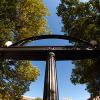Date Set for Downtown Master Plan Hearing
Want to shape the future of downtown Athens? Here's your chance.
A second public hearing on the downtown plan is scheduled for 6:30 p.m. Thursday, Apr. 25 in the Classic Center's Grand Hall (a bigger space than the last hearing in November in one of the ballrooms, which was overflowing with 250 people).
UGA College of Environment and Design professor Jack Crowley and his team of graduate students will present visual concepts for the plan–such as proposed developments–that attendees will rate from one to 10.
"Everybody, again, will have the ability to express themselves..." Crowley told the Athens Downtown Development Authority this afternoon. "It's a very, very interactive process."
In addition to finalizing the plan and a "cookbook" of potential projects developers can draw from, Crowley is looking for ways to pay for the publicly-funded portions of the plan, such as a median on Oconee Street, repairing or rebuilding neglected trestles (including the Murmur trestle) along the future Georgia Railroad rail-trail and a linear park on city-owned land alongside Jackson Street between Hancock Avenue and the Lyndon House.
"One of the big things we hear is pedestrian, bicycle access to downtown," he said. "It could end up in the 10 to 15 million dollar range."
One funding mechanism could be a tax allocation district, which would devote additional property taxes collected on new developments in the eastern portion of downtown to infrastructure improvements within the district. Crowley noted that $150 million worth of new development is already planned or underway between Thomas Street and the North Oconee River, including a new Hyatt hotel, The Standard and the Eclipse on Broad student apartment complexes and the Selig mixed-use project. If the Athens-Clarke Commission acts quickly, by the end of the year, it could include revenue from those developments in the TAD, along with likely future developments he anticipates near the Multimodal Center, on Foundry Street where Good Dirt is now and at the auto repair shop on East Broad Street.
"This is a way to do a lot of the infrastructure that needs to be done to continue to attract private development," Crowley told the ADDA board.
He suggested the ADDA propose a TAD to the ACC Commission, which board members said they would consider next month. The ACC Commission and Clarke County Board of Education would have to approve it as well.
The TAD would allow ACC to borrow $20 million for infrastructure improvements, then pay back the bonds in 13–17 years with revenue from new development without raising taxes. But the additional revenue would not be available for other government services like education. The cash-strapped school district could negotiate to set aside only a portion of new taxes collected in the district.












comments